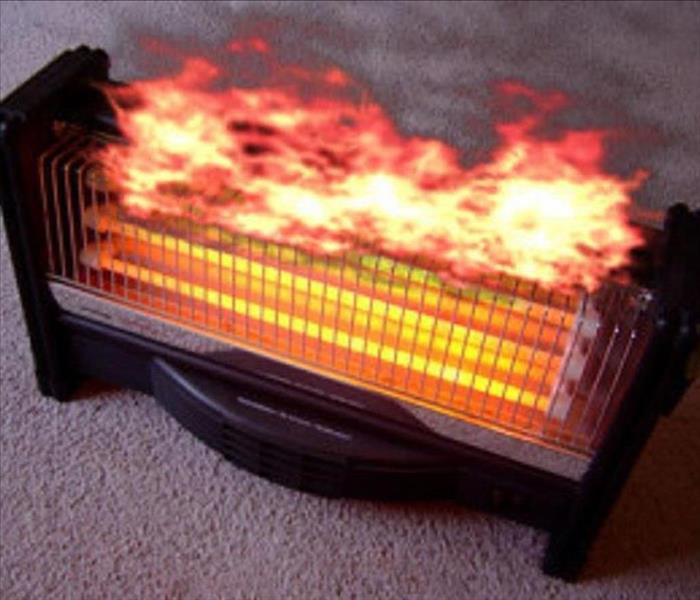Space Heater Safety Tips
11/16/2017 (Permalink)
Heating equipment is the second leading cause of home fires in the United States. More than 65,000 home fires are attributed to heating equipment each year. These fire result in hundreds of deaths, thousands of injuries and millions of dollars in property damage.
Portable electric space heaters can be a convenient source of supplemental heat for your home in cold weather. Unfortunately, they can pose significant fire and electric shock hazards if not used properly. Fire and electrical hazards can be caused by space heaters without adequate safety features, space heaters placed near combustibles, or space heaters that are improperly plugged in.
Space heaters are, of course, designed to be hot. But they shouldn’t burn you or create a fire hazard.
Look for a sensor that shuts the heater off if it overheats. A switch that does the same if they tip over is a welcome plus for taller models, especially if kids and/or pets use the room, too.
Damaged power cords are one of the major causes of fires, injuries, and deaths associated with space heaters. Inspect electric space heater cords for damage regularly and never use an extension cord with an electric heater.
When you shop for an electric space heater, look for a label from a recognized testing laboratory such as UL (Underwriters Laboratory), ETL (Intertek), or CSA (Canadian Standards Association) verifying that the heater's construction and performance meet voluntary U.S. safety standards.
Safety should always be a top consideration when using space heaters. Here are some tips for keeping your home safe and warm when it’s cold outside:
- Make sure your space heater has the label showing that it is listed by a recognized testing laboratory.
- Before using any space heater, read the manufacturer’s instructions and warning labels carefully.
- Inspect heaters for cracked or broken plugs or loose connections before each use. If frayed, worn or damaged, do not use the heater.
- Never leave a space heater unattended. Turn it off when you're leaving a room or going to sleep, and don't let pets or children play too close to a space heater.
- Space heaters are only meant to provide supplemental heat and should never be used to warm bedding, cook food, dry clothing or thaw pipes.
- Install smoke alarms on every floor of your home and outside all sleeping areas and test them once a month.
- Proper placement of space heaters is critical. Heaters must be kept at least three feet away from anything that can burn, including papers, clothing and rugs.
- Locate space heaters out of high traffic areas and doorways where they may pose a tripping hazard.
- Plug space heaters directly into a wall outlet. Do not use an extension cord or power strip, which could overheat and result in a fire. Do not plug any other electrical devices into the same outlet as the heater.
- Place space heaters on level, flat surfaces. Never place heaters on cabinets, tables, furniture, or carpet, which can overheat and start a fire.
- Always unplug and safely store the heater when it is not in use.






 24/7 Emergency Service
24/7 Emergency Service
